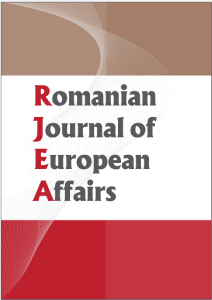APPRAISING THE EUROPEAN NEIGHBOURHOOD POLICY: BACKGROUND, IMPLEMENTATION AND RECOMMENDATIONS
Kerry Longhurst
Abstract:
The present article tackles the European Neighbourhood Policy (ENP) in the context of the European Union’s Eastern neighbours – Ukraine, Moldova and Belarus. Reflected on the May 2011 Communication drafted by the European Commission and High Representative ‘A New Response to a Changing Neighbourhood’, the article focuses on the main steps of ENP’s evolution, looking at the political and economic offer made to the partner countries, the state of the neighbourhood, the progress made in the ENP Eastern countries, the regional component of the policy.
MOVING BORDERS. EUROPEAN IMMIGRATION POLICY AND THE MULTIDIMENSIONAL INSTABILITY OF THE BOUNDARIES
Paolo Cossarini
Abstract:
Two contemporary phenomena in the field of immigration force us to reflect upon the relationship between the migration flows and their political management: the tortuous development of the European immigration policies, and the contemporary struggles between member states in the administration and regulation of the last flows of immigrants coming from the 2011 “Arab Spring” countries. This paper attempts to answer two interrelated questions: What do these phenomena teach us about the features of the political and territorial space called Europe? Is it possible to read the current struggles on immigration as the essential political nature of Europe? Particular attention is paid to the agreement on migration among member states and European institutions and, at the same time, to the dimensions and dialectics of borders, with some examples from the Italian and Spanish cases. In this light, this paper aims to show how a wide theoretical and historical approach can be useful to understand the contradictory character of immigration policy and the multidimensional features of the EU borders.
Keywords: European borders, immigration policy, Italy, Schengen area, Security, Spain
THE EUROPEAN UNION’S QUEST FOR ENERGY POLICY: A GEO-ECONOMIC APPROACH
Alin Codoban
Abstract:
The European Union’s external energy policy architecture is very important for further energy security and economic development. European normative power on its neighbours represents the most efficient way of integrating neighbouring energy markets, with the EU’s emerging internal market and, in perspective, through economic interdependence and complementarities, there are chances of creating an European geo-energy space. EU’s tools for shaping the geo-energy space are becoming more effective in an extended European economic area that would allow it to act as the main actor in a multilateral interconnected system of energy producer and transit countries. The result of the paper is materialized in a new paradigm for EU’s external energy policy, which can provide future security of supply through market institutions and an active economic diplomacy in the resource energy countries.
Keywords: energy markets, European geo-energy space, regulatory framework
IMPLICATIONS OF THE EU MULTI-LEVEL GOVERNANCE IN THE FIELD OF COMPETITION POLICY – A COMPARATIVE ANALYSIS OF THE CHARACTERISTICS OF COHESION AND COMPETITION POLICIES
Florin Bonciu
Abstract:
The paper aims at analyzing the intrinsic characteristics of the European Union and to show that these characteristics objectively require the implementation of multi-level governance. A comparative analysis of the European Union’s cohesion and competition policy is presented from the point of view of these elements. Further on, given the implications of the economic crisis, the paper explores the possible translation from multi-level governance to polycentric governance and its implications for the cohesion and competition policies.
Keywords: cohesion policy, competition policy, European Union, multi-level governance, polycentric governance, structural changes of EU
EUROPEAN EMISSION TRADING SCHEME AT A TURNING POINT – FROM THE PILOT PHASE TO POST-2012
Aura Carmen Slate
Abstract:
Climate change action has become a top priority for the European governments and for the European Union. Since the polluters are part of the energy-intensive industries, the mechanisms designed to reduce greenhouse gas emissions should focus on the economic sector as a primary source of concern. Therefore, environmental issues interrelate with the economic ones and one viable expression of this relation is the EU ETS, a cap-and-trade mechanism. The ETS started with a pilot phase in year 2005 and will continue with a third phase after 2012, period which coincides with the end of Kyoto’s commitment. Although statistical data prove that the EU ETS is becoming more efficient with each phase, in the absence of global involvement the efforts invested in the scheme will be made in vain.
Keywords: allowance, EU-wide cap, European emission trading scheme, greenhouse gases, national allocation plan
ECONOMIC PROBLEMS OF EUROPEAN UNION CAUSED BY THE DEMOGRAPHIC AGEING
Iulia-Alexandra Percă
Abstract:
The purpose of this paper is to offer a realistic perspective upon the imminent situation of demographic ageing issue in European Union. The forecasts are not reasons to major concern for the society but rather to become more responsible and not to neglect a problem that could affect our future. The demographic overview of Europe for 2011 – 2060 shows low birth rates, an increase in life expectancy and migration flows having an impact on population. As a result, the parent generation will no longer completely be replaced by the next generation of children and the narrowed active population will have to sustain a large number of persons far advanced in the age. Economic consequences of this social trend, such as increased expenditures on pensions, extended health care costs and the employment problems, are also discussed in order to define the best policy option available.
Keywords: ageing, births, economic impact, life expectancy, migration, policy options
Book review: STEVEN BLOCKMANS (ED.COORD.) UNIUNEA EUROPEANĂ – UN PROCES DE INTEGRARE CONTINUĂ – LIBER AMICORUM ALFRED E. KELLERMANN
Mihai Sebe
Abstract:
The field of international and European law would never be the same without the enormous contribution of Professor Alfred Kellermann. In this book, dedicated to his career by his fellow colleagues, we are thus invited to read about the main topics of debate in these areas of law. The specialists as well as the general audience have to chance to learn more about the Project for a Constitution for Europe and what it implied for the European institutions (first part of the book). The second part is all about general principles and individual aspects while the last part is dedicated to the New Member States and the Eastern Europe.






